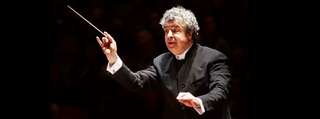|
Back
In The Forests Of The Mind New York
David Geffen Hall, Lincoln Center
02/11/2016 - & February 12*, 13, 16, 2016
Gustav Mahler: Symphony No. 6 in A Minor
New York Philharmonic Orchestra, Semyon Bychkov 
S. Bychkov (© Courtesy of the Artist)
Gustav Mahler treated his Sixth Symphony with the incertitude of an Anton Bruckner. How do you arrange the middle movements? (Mahler kept altering them.) How many “axe-whacks:” should the timpanist give in the final movement? (Out of superstition, Mahler went from unlucky three to a mere two.)
Those questions are easily answered. The unanswerable query is why Mahler erased the subtitle of the work, “Tragic.” What is a great conductor to do? Did Mahler mean to change the tone of the work? Did he decide not to fence in the meaning with a single word? Was he afraid to that some might interpret “tragic” as “sad”, rather than the Greek “tragic” with its essential structural form? (Mahler knew classical drama well.)
That would be the challenge for any conductor and any orchestra. Semyon Bychkov is not “any” conductor. He has a genuine, almost philosophical feeling for his music. Unlike his countryman Valery Gergiev, one doesn’t expect him to break his baton in excitement. Yes, his music is undeniably exciting t, but not purely visceral.
And in his performance of the Sixth, with the Philharmonic, he had an orchestra whose Mahlerian tones were inherited from Leonard Bernstein, yet given the personality last night directly from Maestro Bychkov.
The word “tragic” here simply didn’t apply. Yes, we hard those trademark marches, but from the start, Mr. Bychkov didn’t give them a brutality. The opening march was quick, pointed, disciplined. Less frightening than athletic, masculine, splendid. The following paean for his wife (the so-called “Alma” theme) was equally straightforward. Oh, that melody itself has a romantic aura. But Mr. Bychkov never allowed the New York Philharmonic to be either cloying or overly-voluptuous. It was shining, it was forward, it was (dare I use the word?) respectful.
But to this listener, the mood of the entire Sixth Symphony was given to the following faraway cowbells and trumpet calls. Pairing this with the third movement Andante, one was presented with a composer who could have replaced “tragic” with “bucolic.”
Others could scorn this. Yes, Mahler, who wrote his symphonies far from the political chaos of the city concert-halls, certainly painted the most elegiac picture. But why did the Sixth have so many signals of pain? Or an infernal night? Bychkov’s opening was tough, yes, but the toughness of a sensitive artist who knew that only the most saccharine artists eschewed irony or moments of tragedy.
Thus the following scherzo, while razor-sharp, was never strident. Oh, we had our share of screams but the march was far from shrill. Mr. Bychkov kept this movement from being passive. The sudden changes of tempo were extreme. He was excessively slow, his mysterious moments were shadows. His last march was full, eloquent, cryptic, of course. But always in line with the composer’s own questions.
The third movement–even ore than the volcanic finale–was the heart of this performance. I can think of no Mahler moments which were played with such warmth, such tranquility. Compare this setting with Strauss’s Alpine Symphony, and one compares a painter with a photographer.
The Phil’s soloists, especially English horn player Grace Shryock, allowed the outdoor beauty to shine through. And when the frosty tempest erupted, one thought of it only like a New York cold spell! Unpleasant, but giving even further value to the springtime.
Experienced listeners were ready for “their’ star of the evening, timpanist Markus Rhoten. Spoiler alert. He only gave two of the mighty blows, described by Mahler “with the stroke of an axe” He did pulverize us with those Olympian hits...though us lowbrow listeners would have liked another one!
Yet this was not the point of the symphony. Mr. Bychkov aimed for something far more complex than those great notes. More memorable were the cowbell and trumpet returns, the celestas, the horns and even the discords.
For yes, the Sixth Symphony never ever could last long with a subtitle. Neither “tragic” nor “pastoral” would give credit to a work which interlocked so many emotions at once. Mr. Bychkov’s orchestra on Friday night was not perfect (the horns had some difficulty), but they were certainly alert to his wide-ranging movements. He didn’t make the Sixth emotionally lucid. But his feelings and his results were emotionally lucent, and, like Mahler himself, inextinguishable.
Harry Rolnick
|